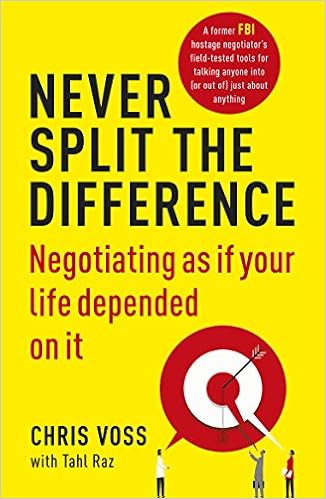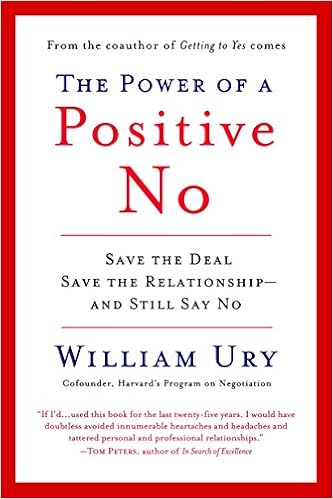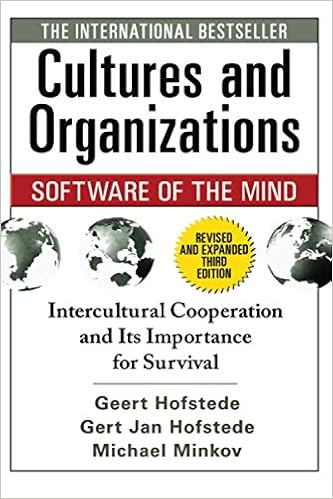
"Ein Haus ohne Bücher ist arm, auch wenn schöne Teppiche seine Böden und kostbare Tapeten und Bilder die Wände bedecken."
- Hermann Hesse -
Literatur
Verhandlungen
Roger Fisher, William Ury, Bruce Patton
Getting to Yes
I must admit, I am a fan and we teach this in our negotiation seminars. The Harvard Concept offers a framework which can lead to an agreement from which both (or all) parties can profit. Even the relationship can also be improved. It is not a step-by-step guide of what to do or what to say but following the principles will help you feel better about your negotiation and improve the process.
Chris Voss
Never Split the Difference
The ex-FBI's chief hostage negotiator's account of influencing the other party in negotiations through rhetoric, opening offers, 2nd offers etc. Practical tips which you can try out in your own business negotiations. Chris Voss criticises the Harvard Concept (well, you don't want to get to yes with hostage-takers necessary). That said, his final chapter sums up really for me what the book "Getting Past No" also suggests.
William Ury
Getting Past No
Getting to yes can have its limits when the other party doesn't play ball or refuses to negotiate. Here you'll find approaches to more difficult negotiation partners and situations, based upon the Harvard Concept. We tend to cover these aspects in our training on advanced negotiation.
Howard Raiffa
The Art and Science of Negotiation
Raiffa was a mathematician and decision theorist who contributed to the Harvard Negotiation Program. His work revolves around statistics and how to work out the value in monetary terms of a negotiation. Not always an easy read, but if you like analysis and game theory, this might be for you.
Igor Ryzov
The Kremlin School of Negotiation
My decision to buy this book was based on the title alone. A fresh perspective (Russian one, obviously) on negotiation as a lot of literature comes from the USA. It contains useful advice on what to say and how to say it and personal negotiation examples from the author.
Leigh Thompson
The Mind and Heart of the Negotiator
I enjoy reading and watching Prof. Leigh Thompson (see Youtube). She offers, in my view, a very hands-on approach to negotiation as well as backing it up with lots of scientific studies. This is her textbook on negotiation, used in her teaching at Northwestern University.
Cross-Cultural Communication
Gert Hofstede
Cultures and Organizations: Software of the Mind
Hofstede's 6 dimensions explained in great detail, what they mean for interactions and doing business with other cultures. Not always the most leisurely read in my view, but well worth a look if you want to understand the significant differences.
Richard Lewis
When Cultures Collide
In my opinion, an excellent introduction to cultural differences and how to "categorise" culture. Full of anecdotes, models as well as do's and don'ts. The second half of the book is full of country cases - some longer, some shorter - on what to do when holding meetings and negotiations with people from other cultures. A guide to have on your shelf!
Communication & Persuasion
Thomas Erikson
Surrounded by Idiots
This book delves into the DISC model, categorizing personalities into four colors: Red, Blue, Green, and Yellow. The book offers practical strategies for understanding and communicating effectively with each type, enhancing personal and professional relationships through improved interaction. If you like it, take a look at the follow-ons (dealing with narcissists etc.)
Robert Cialdini
Influence: The Psychology of Persuasion
If you want to understand the topic of influence, be it in our private or business lives, then look no further. Basically, all negotiation tactics fall into one of the 6 areas identified by Robert Cialdini, Professor of Psychology and Marketing at Arizona State University. He has spent decades researching the subjects and conducting all sorts of experiments. Worth a read!
Marshall Rosenberg
Non-Violent Communication
A way of talking to each other without hurting the other side. Marshall B. Rosenberg developed the "language of life" as a social worker, dealing with racial tension in the United States. Despite the apparent "simplicity", still not easy to do and further training is recommended for those interested in taking it further.
Daniel Kahnemann
Thinking, Fast and Slow
Kahneman’s theories and findings (and those developed with the late Amos Tversky) are in here - includes the framing effect, approach to risk, the law of numbers etc. If you're a fan of decision-making and how our brains are manipulated, then worth a read. Probably not done in a weekend, though!
Culture and Country Specific
Alexander Thomas, Eberhard Schenk, Wolfgang Heisel
Beruflich in China
The Chinese culture, thousands of years in its development, meets modern-day China. Differences between Germans and Chinese regarding communication, decision-making and business networking are highlighted with anecdotes and cases. Of course, strategies for negotiation successfully with the Chinese don't go amiss! German language only.
Stefan Schmid, Alexander Thomas
Beruflich in Großbritannien
Why are the British always apologising for things, why can't they just speak their mind and why do they get so drunk on holiday? Answers to these questions and more can be found in this book on the British cultural standards. The examples inside are more from private life rather than business. Still, the explanations, in particular the historical foundation, are excellent. German language only.
Katrin Mitterer, Rosemarie Mimler, Alexander Thomas
Beruflich in Indien
When negotiating with people from India, you may wonder why they find it difficult to say no, sometimes get quite emotional and have enormous respect for elders and authority. Along with further cultural standards, these behaviours are illustrated using a variety of business and negotiation scenarios. German language only.
Tatjana Yoosefi, Alexander Thomas
Beruflich in Russland
Negotiating with Russians involves understanding their approach to time, getting things done and their view of authority. Here you will find the Russian cultural standards explained as well as strategies for improving your collaboration. German language only.
Emily Slate, Sylvia Schroll-Machl
Beruflich in den USA
Time is money, performance-orientation and the constant strive for more— just some of the cultural standards which describe US-American behaviour in this guide. Useful background information, amongst others, on the pilgrims, immigration and geography, which really do help explain things! German language only.
























